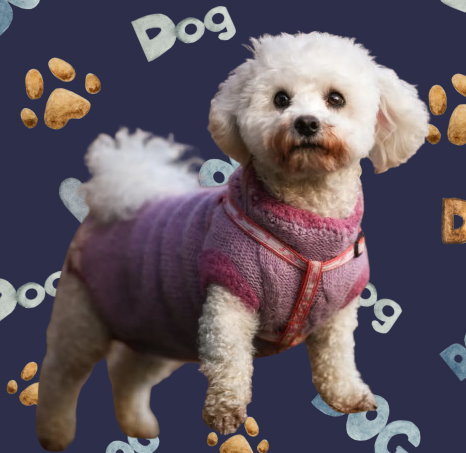Welcome to Dog Training Newbies !
Welcome to Dog Training Newbies !

Bichon Frises are small, affectionate dogs known for their cheerful disposition and fluffy white coats. However, like many small breeds, Bichon Frises can be particularly sensitive to noise. Loud sounds such as thunderstorms, fireworks, or even everyday household noises can cause significant stress and anxiety in these dogs. Understanding and managing noise sensitivity in Bichon Frises is essential to ensuring their comfort and well-being.
UNDERSTANDING NOISE SENSITIVITY IN BICHON FRISES
Noise sensitivity in dogs is often linked to their heightened sense of hearing. Bichon Frises, with their alert nature, can easily become startled by unexpected loud noises. This sensitivity can result in a range of reactions, from mild unease to severe anxiety. The causes of noise sensitivity in Bichon Frises can be varied, including genetics, a lack of early socialization, or traumatic experiences with loud sounds in the past.
Common signs of noise sensitivity in Bichon Frises include trembling, excessive barking, pacing, hiding, or seeking constant reassurance from their owners. In more severe cases, they might attempt to escape the noise source, potentially putting themselves in dangerous situations. Recognizing these signs early is key to managing the condition effectively.
CREATING A SAFE SPACE
One of the most effective strategies for managing noise sensitivity in Bichon Frises is creating a safe, quiet space where they can retreat during loud events. This space should be a calm environment, such as a quiet room or a cozy crate, where your dog feels secure. You can make the space more comforting by adding their favorite blankets, toys, and possibly an item with your scent, like an old T-shirt.
Soundproofing the area with heavy curtains or using noise-canceling devices can help reduce the intensity of the noise. Additionally, playing soft, calming music or white noise can help drown out the sounds that trigger your Bichon’s anxiety.
DESENSITIZATION AND COUNTERCONDITIONING
Desensitization and counterconditioning are two powerful training techniques used to help dogs cope with noise sensitivity. Desensitization involves gradually exposing your Bichon Frise to the noise that causes them stress, starting at a very low volume and gradually increasing it over time. This slow exposure helps the dog become accustomed to the sound without experiencing fear.
Counterconditioning involves pairing the exposure to noise with positive experiences, such as treats, playtime, or affection. For instance, if your Bichon Frise is afraid of thunder, you could play a recording of thunder at a low volume while offering their favorite treat or engaging them in a fun activity. Over time, they may begin to associate the sound of thunder with positive experiences rather than fear.
These techniques require patience and consistency. It’s important to move at a pace that your dog is comfortable with and to avoid overwhelming them. If your Bichon shows signs of distress during training, lower the volume of the noise and proceed more slowly.


PROFESSIONAL HELP
For Bichon Frises with severe noise sensitivity, it might be necessary to seek help from a professional dog trainer or a veterinary behaviorist. These professionals can assess the severity of your dog’s anxiety and develop a customized training plan. In some cases, they might recommend the use of anti-anxiety medications or natural supplements to help manage your dog’s stress.
A professional trainer can also teach you how to implement desensitization and counterconditioning techniques effectively, ensuring that your dog’s anxiety is managed in the best possible way.
MAINTAINING CALMNESS
Dogs are highly perceptive to their owners’ emotions, and a calm, composed demeanor can greatly influence how your Bichon Frise reacts to noise. If you remain calm during loud events, your dog is more likely to feel secure and less anxious. Avoid overreacting to the noise yourself, as this can reinforce your dog’s fear.
Instead, try to engage your dog in a calm activity or distract them with a toy. Praising them for calm behavior during noisy situations can also help reinforce a positive response.
REGULAR EXERCISE AND MENTAL STIMULATION
Regular physical exercise and mental stimulation are essential for managing noise sensitivity in Bichon Frises. A tired dog is generally more relaxed and less likely to react strongly to loud noises. Ensure your Bichon gets plenty of exercise, whether it’s through walks, playtime, or interactive games that engage their mind.
Mental stimulation can also help reduce anxiety by keeping your dog’s mind occupied. Puzzle toys, obedience training, and scent work are great ways to challenge your Bichon’s brain and help them stay calm.
LONG-TERM MANAGEMENT
Managing noise sensitivity in Bichon Frises is an ongoing process. With time, patience, and consistent training, many dogs can learn to cope with their sensitivity and experience less anxiety. Regularly evaluate your dog’s progress and adjust your approach as needed. Some dogs may require ongoing support, while others may respond well to initial training efforts.
In addition to training, consider incorporating natural calming aids into your Bichon’s routine, such as calming sprays, pheromone diffusers, or anxiety wraps. Always consult with your veterinarian before introducing any new products to ensure they are safe and appropriate for your dog.
By understanding and addressing noise sensitivity in your Bichon Frise, you can help them live a happier, more comfortable life, free from the stress and anxiety that loud noises can cause.